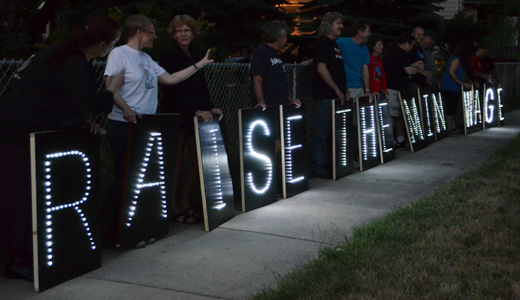
WASHINGTON – For seven years, Carolle Fleurio has been a cook at a family restaurant in Stockbridge, Ga. It’s a nice place, she says, where people come in to enjoy the atmosphere and the meals she cooks.
But one thing wrong with her job, Fleurio adds, is the pay. She makes $8 an hour. That’s only slightly more than the U.S. minimum wage and only slightly more than the $6.85 she earned hourly when she began – and it’s not enough to raise a family on.
She can’t stay home from work when sick, as the restaurant has no paid sick leave.
Fleurio is one of the millions of workers nationwide who would benefit from current proposals to raise the federal minimum wage from its current $7.25 an hour to at least $9, in three installments from now through early 2016, and then index it to inflation.
And though she makes more than the minimum, both those workers and workers like her – earning just above the minimum – would benefit from a minimum wage hike, she told senators on March 14 as lawmakers opened hearings on the raise.
“Although I enjoy my job, it’s difficult to support a family on $8 an hour,” she told the Senate Labor Committee here. Like a majority of low-wage and minimum-wage workers, Fleurio is her family’s breadwinner. Her husband is retired and disabled.
“My paycheck has to pay for everything,” except car insurance and her husband’s medical bills, Fleurio explained. Her pay, as little as it is, covers the home mortgage, utilities, garbage disposal fees, food and household bills for Fleurio, her husband, two daughters, her granddaughter and a niece. .
“I have gotten several small raises. However, the cost of milk and gas keeps going up. Even though I’m not getting ahead, these raises keep me and my family from falling too far behind the cost of living. Many people I know don’t even get those small raises. That just doesn’t seem right,” she said. (Article continues after video.)
Fleurio was one of four witnesses telling lawmakers why they should raise the minimum wage, but it quickly became clear that President Barack Obama, the workers and their allies, organized labor and Democratic senators – all of whom favor the raise and the indexing – face a partisan fight, as usual, from the GOP.
That’s because Sen. Lamar Alexander, R-Tenn., not known as a right-wing radical, trotted out the business community’s usual bleats that raising the minimum wage would cost low-wage workers – such as Fleurio – their jobs. Employers would not be able to afford to hire those workers or pay them more, Alexander claimed.
Other witnesses, however, presented studies disproving the business’ argument.
Lew Prince of St. Louis, CEO of Vintage Vinyl, the largest independent CD-DVD record store in the Midwest, had a retort for Alexander. Raising the minimum wage helps increase business, he said. Vintage Vinyl, founded in 1979, has always paid more than the minimum “and the return on that investment has been huge,” he added. “Good wages are a good business strategy,” Prince declared.
“For this small extra investment, I get loyal, long-term employees devoted to my company, employees whose ongoing relationships with my customers have built my business,” he explained. “Higher wages made us more competitive.”
When Prince and a partner started Vintage Vinyl, the minimum wage was $2.90, or $9.20 now after adjustments for inflation. “Even back then, it had eroded from 1968, which would be $10.59 in today’s dollars. We never would have believed that 34 years later the buying power of minimum wage workers would actually be lower,” he said.
“That’s terrible for small business, terrible for our economy and terrible for our country. If we had indexed the minimum wage to inflation back then, we wouldn’t have this problem now. If we had indexed back then, my business would have benefited from the buying power of my customers being steady and predictable for the last 34 years.”
Missouri indexed its minimum wage, which is higher than the federal wage, since 2007.
Their testimony, and more, convinced the Democrats. “If you work hard and play by the rules, you should be able to support your family, join the middle class, and build a brighter future for your children,” Labor Committee Chairman Tom Harkin, D-Iowa, said.
Obama wants to raise the minimum wage to $9 hourly, then index it. Harkin and Rep. George Miller, D-Calif., top Democrat on the hyper-partisan GOP-run House Education and the Workforce Committee, want to raise it to $10.10 hourly, then index it. That would put another $1,000 yearly in a minimum wage worker’s pocket.
House Democrats forced a vote on the minimum wage hike to $10.10 on March 15. They lost on a party-line 223-184 tally, drawing the ire of the Service Employees. No Republicans voted for the increase.
“The rich are doing just fine,” SEIU President Mary Kay Henry said sarcastically after the vote. “It is ordinary, working families who need their elected officials to stand up for them…The recovery is not widely shared. Too many families are struggling to get by. Lawmakers who steadfastly oppose increasing the minimum wage should be pre-pared to tell their constituents why they voted against a raise for hardworking people.”
“Today, tens of millions of hardworking Americans who are earning at or near the minimum wage can’t even aspire to live a middle class life,” Harkin said. “A critical first step is to ensure they earn a fair day’s pay for a hard day’s work.”
Photo: Wisconsin Jobs Now went out with Occupy Riverwest and the Overpass Light Brigade to raise awareness about the need to raise the minimum wage. CC BY-NC 2.0












Comments